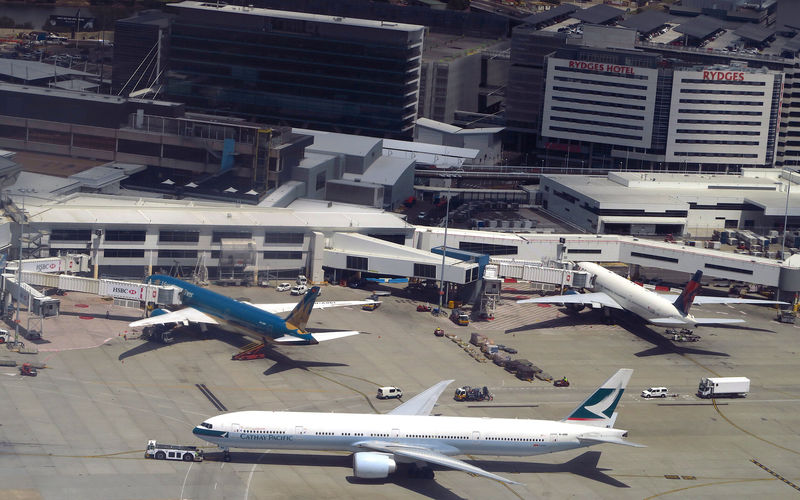By Jamie Freed
SYDNEY (Reuters) - As more countries look to privatize airports two conflicting narratives have taken wing: airlines point to Australia's big city airports as a cautionary tale of light regulation, while airports say they've found a winning formula for governments, investors and passengers.
Two decades after airports in Sydney, Melbourne, Brisbane and Perth were sold to pension funds and infrastructure investors, they are reporting the highest margins in the world, data from trade group Airlines for Australia & New Zealand (A4ANZ) shows.
A key factor - and one the airlines are trying to change - is that the government cannot regulate fees or even intervene in disputes over them.
Ahead of an Australian government review later this year, airlines are using the International Air Transport Association (IATA) annual meeting, which starts on Sunday in Sydney, as a platform to loudly argue for new rules that could lower their costs, kicking off a furious industry debate.
"It isn't wrong to say there needs to be some kind of oversight that ensures that the behavior of the service provider and the service receiver, if you will, act in an appropriate manner," John Borghetti, chief executive of Australia's second-biggest airline, Virgin Australia Holdings Ltd (AX:VAH), told Reuters.
Airport take-off and landing charges have risen 26 percent in real terms over the last decade to as much as A$18.30 ($13.81) per passenger, according to a report the Australian competition regulator released in April.
A4ANZ says ticket prices have fallen by 40 percent during the same period, shifting profits from airlines to airport operators and making it difficult to cut fares further.
The Australian rules, which maximized what the government could get upfront from selling the airports, are more extreme than that in other regions with large privatized airports like Europe.
The system is raising concerns among airlines that other countries looking to privatize airports, such as Japan, India and Vietnam, could use Australia as a model.
"We must find an effective regulatory solution to ensure that Australia is well served with competitive infrastructure," IATA CEO Alexandre de Juniac told reporters on Thursday.
Airport operators, however, say Australia is a success story, with more than A$11.5 billion ($8.68 billion) of capital invested over the last decade, allowing for world-class facilities with cutting-edge automated and biometric technology.
Sydney Airport Holdings Pty Ltd (AX:SYD) CEO Geoff Culbert said Australia's biggest airport is investing more than A$1 million a day to improve capacity, services and facilities.
"This is all privately funded and comes at no cost to the taxpayer," he said.
What airlines really want, said Airports Council International (ACI) Director General Angela Gittens, is a return to lower fees, in the days when airports were government-owned, had less sophisticated management teams and suffered from overcrowded infrastructure.
"That is a time that has passed," she said. "Governments have found that under the right circumstances they can get private investment. They don't have to decide whether I'm going to spend money on an airport versus spending money on a hospital versus spending money on education."
ACI data shows that airport charges typically make up only 5 percent of airline operating costs and that lower fees are not usually reflected in ticket prices.
The light-handed Australian privatization model, criticized by the country's competition regulator, is just as polarizing for industry experts as it is with airports and airlines.
"Because it is a highly regulated industry there must always be some parameters," said Priveen Raj Naidu, CEO of Singapore-based consultancy Reapra Aviation Partners, which has airport and government clients in Nepal, Myanmar, India and Vietnam. "In Australia it was a free for all. There is no baseline. This is where the government needs to get involved."
CAPA Center for Aviation Executive Chairman Peter Harbison said it was natural for the airlines to argue hard for more regulation in Australia given it is in their interest to reduce fees.
"We have got some of the best infrastructure in the world I think in Australia largely because of the privatization," he said. "Is it cheap and lowest cost? Very much no."
($1 = 1.3256 Australian dollars)
